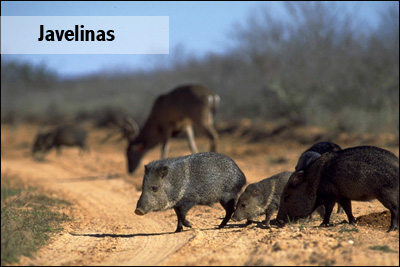Did You Know?
Look, But Don't Feed Wildlife in Texas State Parks

AUSTIN, Texas – A ban on wildlife feeding in state parks may seem counterintuitive for many urban-based park visitors, most of whom grow up feeding and caring for pets and often see wild animals in a similar light. But the fact is feeding free ranging wild animals is bad for people and animals.
That’s why the Texas Parks and Wildlife Commission voted in 2004 to prohibit visitors from feeding wildlife in Texas State Parks.
Walt Dabney, Texas State Parks director, told commissioners the feeding ban addresses a very real human health and safety issue. He pointed out that feeding wild animals in state park campgrounds perpetuates habitat degradation, can lead to an unnatural and unhealthy increase in animal population levels, and increases the possibility of the transmission of diseases and of humans or pets being injured or killed by wildlife.
“When wild animals begin associating humans with food, they don’t become less wild; they just lose their inherent fear of humans,” Dabney said. “Thus, with animals and humans in close proximity, increased chances of wildlife biting, charging, goring, or kicking visitors becomes a real possibility. Having wild animals living in an unnatural environment where they are being fed is not what we want.”
Dabney cited two close calls that could have been “horrible” for park visitors because of an aggressive javelina at Choke Canyon State Park and an aggressive feral hog at Fairfield Lake State Park. Park personnel, he said, were forced to shoot the hog and the javelina, because the animals were endangering campers.
State park law officers and game wardens have the authority to enforce the feeding ban rule and could charge flagrant offenders with a Class C misdemeanor, punishable by as much as a $500 fine. However, Dabney said the emphasis is on educating park visitors about the rule change through posted signs, issuing warnings to first-time violators and other measures.
The new rule, which applies to wildlife feeding in state parks only, is not meant to prohibit “reasonable things, like having bird feeders which are designed to keep out other animals” placed in designated wildlife viewing areas, the state parks director said. He said park superintendents may allow, on a case-by-case basis, bird feeders that do not allow other wildlife to access the feed. Parks may also allow feeding outside of campgrounds or other developed areas to bring wildlife to observation or photography blinds in controlled situations that don’t cause animals to associate humans with feeding.
“We’re not trying to discourage one of the most enjoyable activities in our state parks – the viewing of the wild animals – but it’s not acceptable to have these animals bedded down in our campsites or rummaging through coolers,” Dabney said.
With the approved amendment, the “wildlife” section of the Rules of Conduct in State Parks now states that it is an offense to: “feed or offer food to any wildlife or exotic wildlife, or to leave food unsecured in a manner that makes the food available to wildlife or exotic wildlife, unless specifically authorized by the department. The feeding of birds may be permitted on a park-by-park basis as prescribed by the department.”
 Texas Parks and Wildlife Department, 4200 Smith School Road, Austin, TX 78744
Texas Parks and Wildlife Department, 4200 Smith School Road, Austin, TX 78744


